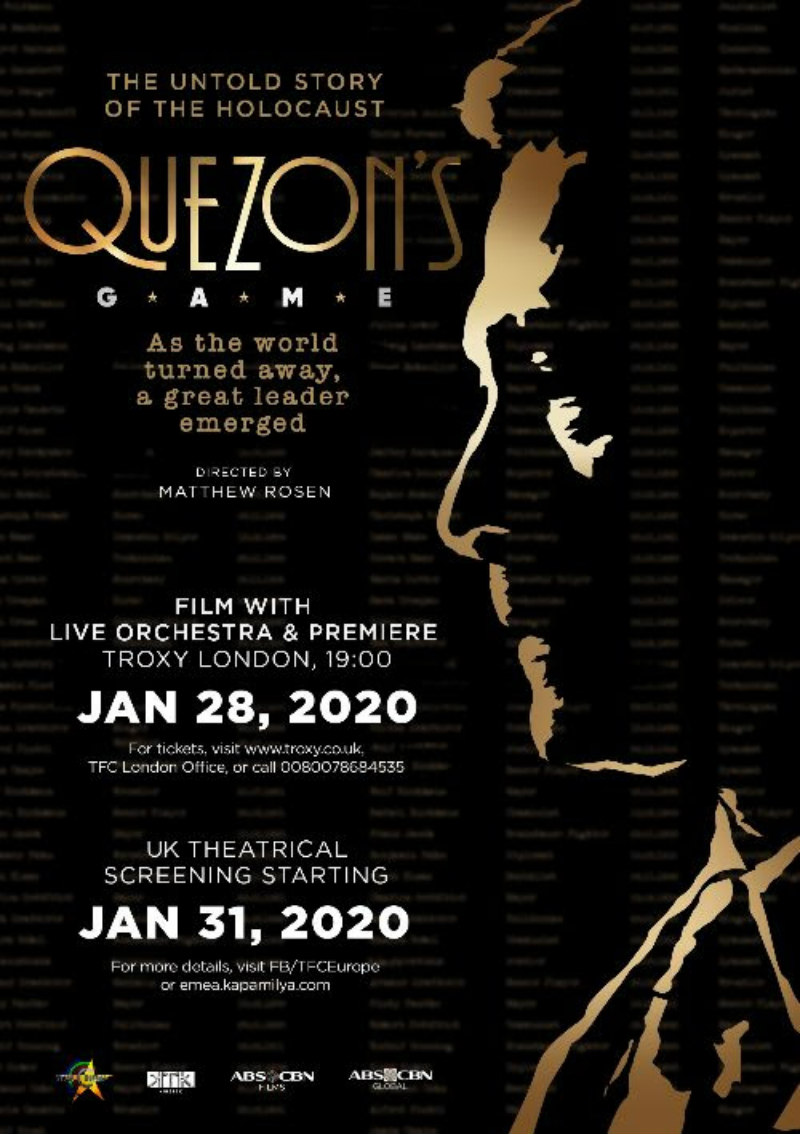
In 1938, Philippine President Manuel L. Quezon agrees to welcome Jewish refugees from Germany in the Philippines.
Review by Musanna Ahmed
Directed by: Matthew E. Rosen
Starring: Raymond Bagatsing, Rachel Alejandro, Kate Alejandrino, Billy Ray Gallion, David Bianco, Jennifer Blair-Bianco

Quezon's Game opens with the image of former Philippine president Manuel L. Quezon (Raymond Baqatsing, performing head and shoulders above his co-stars) and his wife watching a news clipping detailing the Nazis operating at the height of their power, to which Manuel responds, "Could I have done more?"


We then burst back to 1938, the year in which the President did what he could by taking in thousands of Jewish refugees from Germany. The correlation to Schindler's List goes beyond the heroism of the lead characters - director Matthew E. Rosen even applies a similarly limited colour palette to his images, with the exception of some vibrant visuals in the first act when things aren't yet so gloomy.
[ READ MORE: New Release Review - Richard Jewell ]
This true story comes with a note that scenes have been added for dramatic purpose. Even without knowing the true story - which I suspect a lot of people won’t, since there aren’t many research materials out there - your sixth sense for cinematic storytelling will inform you greatly to which scenes have been added, as the film follows the template of a traditional historical biopic for a perfectly linear arc, with all obstacles and surprises predictably laid out.


Though, in this case, it's tough to really say that the real narrative has been diluted for the big screen, to say it's been "Hollywood-ised", because, as aforementioned, this is a largely untold story. The merit of Quezon’s Game is that it’s not only one of our few filmic points of reference for the Philippines around the time of the Holocaust, but it’s one of the few Second World War films to even feature this heroic world leader.
[ READ MORE: New Release Review - Queen & Slim ]
While I appreciate the new perspective, the problem with Quezon’s Game is in the storytelling itself. So much of the film is made up of flat debates between the political team (one of whom includes then-future president Dwight Eisenhower, depicted entirely unremarkably by actor David Bianco), inadequately paced and with none of the urgency of Darkest Hour. The pure moments of emotion are found in scenes of Quezon in his domesticity, speaking with his wife and daughter or taking a private moment with his colleagues to discuss what must be done.


I'm curious to see how this film will play to international audiences because it's squarely aimed for the native audience, a motive never clearer than when Quezon utters "I don't want the Filipino people to worship me, I just want them to be proud of what I did." Sharp jabs at the USA’s role in the late 1930s - the initial refusal to take in thousands of refugees, the obsession with Commies - give it an edge.
However, even for the Filipino viewers, the patriotic sentiments are captured just by knowledge of the premise - two warmly lit hours of politicians going around in circles doesn’t do much more to stimulate the emotions. Everything that works in Quezon's Game is by inheritance rather than effort.

Quezon's Game is in UK cinemas January 31st.
"Whether you know a little or a lot about Mister Rogers, nothing will prepare you for the emotional experience in this neighbourhood."— 𝕋𝕙𝕖𝕄𝕠𝕧𝕚𝕖𝕎𝕒𝕗𝕗𝕝𝕖𝕣.𝕔𝕠𝕞 🎬 (@themoviewaffler) January 27, 2020
A BEAUTIFUL DAY IN THE NEIGHBOURHOOD is in UK/ROI cinemas Friday.
Read @musannaaa's reviewhttps://t.co/FjejHlsOKY pic.twitter.com/i7727mf3gs

